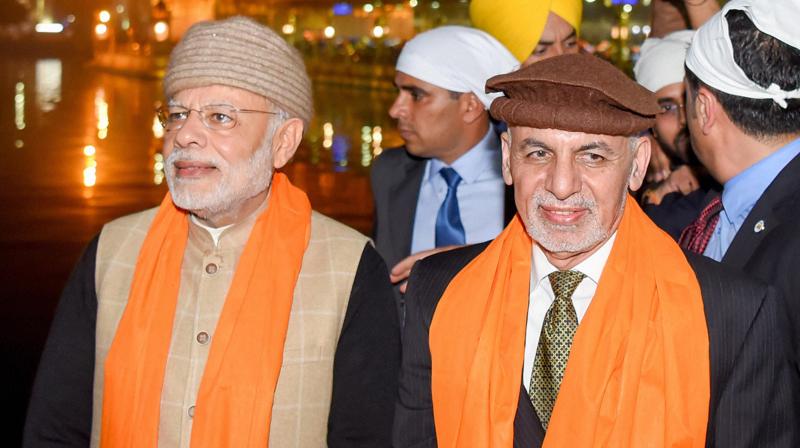India seems to be in a quandary over Afghanistan. It does not want to be seen hobnobbing with the Taliban for fear of undermining its skewed and self-serving narrative on terrorism. Equally, it does not want to be absent from the table when the time comes to settle the matters concerning Afghanistan.
It was under India’s presidency that the United Nations Security Council adopted resolution 2953 on Afghanistan on 30 August 2021. The resolution, on which both China and Russia abstained, set a whole raft of well-known conditions before the international community could formally recognise the Taliban government.
While the world is still insisting on the Taliban to form an “inclusive government”, important countries, individually and collectively, have been reaching out to the Taliban to avert a humanitarian crisis in the country with serious domino effects.
An unstable Afghanistan even under the Taliban can become a safe haven for terrorism, especially the Islamic State-Khorasan which has carried out a number of terror actions since 15 August, the day the Taliban finally took over Kabul.
Not that there has been no contact between Indian and the Taliban. A Taliban representative met the Indian Ambassador in Doha on 31 August – and it was officially acknowledged. It is, however, not clear whether any further meetings took place between the two sides.
Now after many multilateral conclaves on Afghanistan, including the ones by G-20 and Russia, India has also reportedly decided to convene a conference on Afghanistan in New Delhi during the second week of next month.
The conference would be chaired by India’s National Security Advisor, Ajit Doval. Interestingly, he has also reportedly invited his Pakistani counterpart to attend the conclave.
It remains to be seen if the Taliban government is also invited to the conference. Although it is highly unlikely that India would allow the Amrullah Saleh cabal to be present at the conference, there is no telling what the Modi-Doval combine might not do to malign Pakistan.
At the ongoing UNGA session, an informal meeting of SAARC foreign ministers could not be held as Pakistan and India differed on who should be representing Afghanistan.
Indian Prime Minister Narendra Modi in his virtual address at the G-20 meeting stressed that the international community must move in concert on the issue of extending de jure recognition to the Taliban.
Pakistan is yet to respond to the Indian invite. It goes without saying that views in Islamabad are divided. Some analysts are couching their arguments simultaneously in the larger context of regional peace and the need to break the protracted bilateral impasse.
It is being contended that India is a regional player that has been quite active in Afghanistan during the last fifteen years. It has spent over USD 3 billion in over 500 development projects. Accordingly, India’s involvement in Afghanistan at this critical juncture would be nothing but salubrious on at least two counts.
Firstly, India can contribute meaningfully in humanitarian assistance that is needed massively and urgently by the people of Afghanistan. Secondly, should Pakistan allow India to transport its assistance overland through the Wagah border, the nuclear rivals will have made history by joining hands to assist a fellow SAARC nation.
As well, this cooperation can potentially nudge the two neighbours towards tacit cooperation to prevent Afghanistan from becoming a sanctuary for terrorists of all denominations.
The other side of the argument is that Pakistan needs to be on guard against being inveigled into an unpropitious situation. India is barely reliable. After what India did to Kashmir on 5 August 2019, Pakistan will be ill-advised to engage with its eastern neighbour even it if involves humanitarian assistance to Afghanistan.
In short, Pakistan should stick to its guns so long as India is unwilling to show some seriousness of purpose apropos of settling the longstanding Kashmir dispute.
Since diplomacy is the art of the possible, Pakistan may craft its response to India’s invite along the following lines:
One, Pakistan should insist that it would serve no useful purpose to attend the Delhi conference without the Taliban government being present there.
Two, Pakistan may not attend at the NSA level. Instead, Director General (Afghanistan) or Joint Secretary in the National Security Division may represent Pakistan. Alternatively, Pakistan’s special envoy for Afghanistan may attend. Other invited countries may also prefer to send their respective special representatives for Afghanistan, and not necessarily their national security advisors.
Three, if Islamabad decides to throw caution to the wind and send its NSA to the meeting, it should not be for more than a day trip, and that too without any bilateral engagement on the side-lines of the main event.
There is no doubt Pakistan wants to be as helpful to Afghanistan as possible at this difficult juncture – but it cannot turn a blind eye to New Delhi’s grisly human rights violations in occupied Kashmir.
Four, India would definitely prefer the meet to adopt an outcome document in sync with UNSC resolution 2593. The presence of Pakistan along with the Taliban should help keep things in perspective. Setting skewed preconditions for diplomatic recognition is a recipe for complicating the situation. Afghanistan needs a helping hand, not a list of arrogant and illusory demands.
In the meanwhile, Pakistan should be taking serious initiatives of its own. To begin with, an OIC Contact Group, comprising of Pakistan, Saudi Arabia, Qatar, Iran, Turkey, Egypt, Uzbekistan, Tajikistan, Turkmenistan and Indonesia could be established to visit Kabul at the earliest opportunity.
The OIC must be in the forefront of providing humanitarian and reconstruction assistance to Afghanistan. The Taliban would likely be more forthcoming and accommodating to the Islamic organization than other plurilateral or multilateral forums.
Interestingly, as well as benefiting the people of Afghanistan, a sustained and meaningful Afghanistan-OIC engagement may also help revive the latter, making it relevant to the myriad challenges facing its 57 members.










